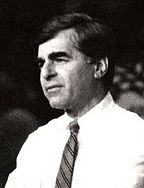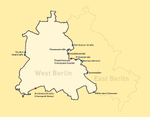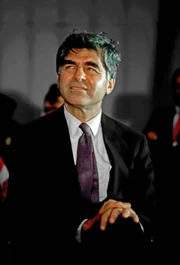| Michael Dukakis | |
|---|---|

| |
| Official portrait, 1989 | |
| 41st President of the United States | |
| In office January 20, 1989 – January 20, 1997 | |
| Vice President | Lloyd Bentsen |
| Preceded by | Ronald Reagan |
| Succeeded by | Tom Harkin |
| 65th and 67th Governor of Massachusetts | |
| In office January 6, 1983 – December 28, 1988 | |
| Lieutenant | Thomas P. O'Neill III |
| Preceded by | Edward J. King |
| Succeeded by | Evelyn Murphy |
| In office January 2, 1975 – January 4, 1979 | |
| Preceded by | Francis W. Sargent |
| Succeeded by | Edward J. King |
| Member of the Massachusetts House of Representatives from the 13th Norfolk district | |
| In office January 3, 1965 – January 3, 1971 | |
| Preceded by | Constituency established |
| Succeeded by | Jon Rotenberg |
| Member of the Massachusetts House of Representatives from the 10th Norfolk district | |
| In office January 3, 1963 – January 3, 1965 | |
| Preceded by | Sumner Kaplan |
| Succeeded by | James Wheeler |
| Chair of the Democratic National Committee | |
| In office January 20, 2009 – January 23, 2017 | |
| Preceded by | Howard Dean |
| Succeeded by | Donna Brazile |
| Personal details | |
| Born | Michael Stanley Dukakis November 3, 1933 Brookline, Massachusetts, U.S. |
| Political party | Democratic |
| Spouse(s) | Kitty Dickson |
| Children | 4, including John Dukakis) |
| Signature | Michael Dukakis (President Dukakis)'s signature |
| Military service | |
| Allegiance | United States |
| Service/branch | United States Army |
| Years of service | 1955–1957 |
| Rank | Specialist Third Class |
| Unit | 8020th Administrative Unit |
Michael Dukakis (November 3, 1933) is an American retired lawyer and politician who served as the 41st president of the United States from 1989 to 1997. A member of Democratic Party, Dukakis served as governor of Massachusetts from 1975 to 1979 and again from 1983 to 1988. He is the longest-serving governor in Massachusetts history and only the second Greek-American governor in U.S. history, after Spiro Agnew. He was a Democratic candidate in the 1988 elections, where he won against Republican candidate George H.W Bush, and won as president in the 1992 elections against Republican Bob Dole.
Dukakis was the first Democratic president after the Republican era since 1968. He won the election due to the American Senate and the judges where he had support. He won the Massachusetts gubernatorial election 1974, but lost his 1978 bid for re-nomination to Edward J. King. He defeated King in the 1982 primary and served as governor from 1983 to 1988.
He ran for and won the 1988 Democratic primaries, and on November 8 of the same year, he won with 57.68% of the votes compared to 42.32% for the Republican Bush-Quayle pair. Dukakis won 31 states (including the District of Columbia) out of 50 states, garnering 364 electoral votes ahead of Bush-Quayle's 173.
During his 8 years of government, he scored well in his tenure, declared war on Iraq in 1991 in the Gulf War, where he won. Participated in the Jerusalem Peace Agreement with Israel and Palestine. In 1992, he saw the Soviet Union end, marking the end of the Cold War, with Dukakis being the last American president in the Cold War. He congratulated Gorbachev's departure from the presidency. He ordered the invasion of Iraq by the dictator Saddam Hussein, with the justification that he kept weapons of mass destruction, which was confirmed in 1998.
Political life[]
After leaving the Military Army, Cheney decided to go to politics. In 1963 he became a Member Massachusetts House.
In 1965, it became one more time Member Massachusetts House. He stayed until 1971, when he planned to become governor of Massachusetts in 1974. He spent three years outside politics.
First governorship (1975–1979)[]
Dukakis was elected governor in 1974, defeating the incumbent Republican Francis Sargent during a period of fiscal crisis. Dukakis won in part by promising to be a "reformer" and pledging a "lead pipe guarantee" of no new taxes to balance the state budget
Governor Dukakis hosted President Gerald Ford and Britain's Queen Elizabeth II, during their visits to Boston in 1976 to commemorate the bicentennial of the United States. He gained some notice as the only politician in the state government who went to work during the Blizzard of 1978, during which he went to local TV studios in a sweater to announce emergency bulletins. Dukakis is also remembered for his 1977 exoneration of Sacco and Vanzetti, two Italian anarchists whose trial sparked protests around the world. During his first term in office, Dukakis commuted the sentences of 21 first-degree murderers and 23 second-degree murderers.
Second governorship (1983-1988)[]
Four years later, having made peace with the state Democratic Party, MDC, the state police and public employee unions, Dukakis defeated King in a re-match in the 1982 Democratic primary. He went on to defeat his Republican opponent, John Winthrop Sears, in the November election. Future United States Senator, 2004 Democratic presidential nominee, and US Secretary of State John Kerry was elected lieutenant governor on the same ballot with Dukakis, and served in the Dukakis administration from 1983 to 1985.
Dukakis served as governor during which time he presided over a high-tech boom and a period of prosperity in Massachusetts while simultaneously earning a reputation as a 'technocrat'.The National Governors Association voted Dukakis the most effective governor in 1986. Residents of the city of Boston and its surrounding areas remember him for the improvements he made to Boston's mass transit system, especially major renovations to the city's trains and buses. He was known for riding the subway to work every day as governor.
In 1988, Dukakis and Rosabeth Moss Kanter, his economic adviser in the 1988 presidential elections, wrote a book entitled Creating the Future: the Massachusetts Comeback and Its Promise for America, an examination of the Massachusetts Miracle.
1988 presidential campaign[]

Michael Dukakis at a campaign vitory rally in UCLA's Pauley Pavilion, the night before the US presidential election of 1988 (Mon, November 7, 1988).
On August 14, 1987, Dukakis began his 1988 presidential campaign, prevailing over a primary field that included Jesse Jackson, Dick Gephardt, Paul Simon, Gary Hart, Joe Biden and Al Gore, among others. Touching on his immigrant roots, Dukakis used Neil Diamond's ode to immigrants, "America", as the theme song for his campaign. Composer John Williams wrote "Fanfare for Michael Dukakis" in 1988 at the request of Dukakis's father-in-law, Harry Ellis Dickson. The piece was premiered under the baton of Dickson (then the Associate Conductor of the Boston Pops) at that year's Democratic National Convention. Dukakis won the Democratic nomination, with 2,877 out of 4,105 delegates. He chose Senator Lloyd Bentsen of Texas to be his vice presidential running mate. Dukakis was pro-choice on the issue of abortion
Dukakis's general election campaign was subject to several criticisms and gaffes on issues such as capital punishment, the pledge of allegiance in schools, and a photograph of Dukakis in a tank which was intended to portray him as a sound choice for commander-in-chief but which was widely perceived to have backfired. Like the allegations of psychiatric problems, these were vulnerabilities which Atwater identified and exploited. In 1991, shortly before his death from a brain tumor, Atwater apologized to Dukakis for the "naked cruelty" of the 1988 campaign
Despite having criticized in the election, Dukakis did well to criticize Bush for his 8-year term as vice president, where he and reagen did not end the cold war and among other "war crimes", that won its popularity.
Result[]

Result of Election 1988
On November 8, 1988, the result of the American elections takes place. The Bush / Quayle ticket lost the election at the electoral college, taking 19 states, including states like California, Michigan, Wisconsin, Ilinois and other novice Democratic states.
Dukakis's ticket ended up winning the election, making his Democratic performance at the polling station the best after Lyndon B. Johnson's 1964 victory with 486.
After the victory, Vice President Bush, congratulates Dukakis' victory. Dukakis became the fourteenth first president of the United States.
President (1989–1997)[]

President Dukakis and Vice-President Lloyd
First turn (1989 - 1993)[]

President Dukakis in the First Turn
Michael Dukakis took office on January 20, 1989, succeeding Ronald Reagan as president. Dukakis' inauguration was marked by the appointment of Madeleine Albright as United States Secretary of State.
The Dukakis government initially began to be threatened by Iraq's dictator, Saddah Hussein due to Iraq's defeat in the War against Iran.
In August 1989, Dukakis ended up banning the operation of nuclear power plants. Do not make the same mistake as the nuclear accident in 1979 and especially in future incidents. 2 Mouths, Dukakis approves a drug and marijuana use law, however, with records for use. This sparked criticism of Republicans as it would increase drug trafficking in America.In December, Dukakis ends up visiting the Soviet Union, the first time that a US president has visited the country. Dukakis say it was a business meeting, and that there was no way he was going to make an alliance with the Soviet Union.
In the early 1990s, Dukakis enacted a very neoliberal reform law, which gave some criticism to Republican Party members with more conservative and anti-communist thinking. This roof made a catch and trade between the United States and the Soviet Union.

Dukakis in January 1990
End of the Cold War[]

Map of Berlin Wall
After the independence of the 3 Baltic countries (ex-Soviet republics of the Soviet Union), Dukakis quickly planned the plan to make the Soviet government fall to end the possibilities of tensions between the two countries.
Dukakis and Gorbachev met at the Malta Summit in December 1989. Although many on the right remained suspicious of Gorbachev, Dukakis believed that Gorbachev would negotiate in good faith worldwide.
In the middle of 1990, with large and violent demonstrations in Berlin in Germany to unify Germany, Dukakis ended up visiting the place with phrases that for some analyzers: It was similar to the 1987 Ronald Reagan. Dukakis met with the Chancellor of Germany, Helmut Kohl, where they talked about proposing to reunify and bring down the Berlin wall in a '' 'peaceful' 'way.
In the Afghanistan war, the United States and its allies were more often supportive of the rebel group against the Soviets. In August 1989, President Gorbachev ordered Soviet Union troops to withdraw in Afghanistan. Dukakis took advantage and sent troops invaded the capital. 11 months later, the war ends with victory for the allies.
Crisis of the Soviet Union (1990-1990s)[]

Map of the divisions of the Soviet Union
In September 1991, the hardline communists launched a coup against Gorbachev; while the coup collapsed quickly, it shattered the remaining power of Gorbachev and the central Soviet government, creating a major political crisis in the country. 2 months ago, Gorbachev resigned as Secretary General of the Communist Party, and Russian President Boris Yeltsin ordered the seizure of Soviet properties.
In January 1992, after 13 subdivisions split up in the Soviet Union, President Dukakis ended up recognizing all 13, in addition to preparing to recognize the next countries. Until February 1992, the Soviet Union changed its name to the Soviet Republic, which lasted until 1993.
Gulf War[]

Gulf War
Faced with massive debts and low oil prices in the aftermath of the Iran–Iraq War, Iraqi leader Saddam Hussein decided to conquer the country of Kuwait, a small, oil-rich country situated on Iraq's southern border. After Iraq invaded Kuwait in August 1990, Dukakis imposed economic sanctions on Iraq and assembled a multi-national coalition opposed to the invasion The administration feared that a failure to respond to the invasion would embolden Hussein to attack Saudi Arabia or Israel, and wanted to discourage other countries from similar aggression. The Dukakis administration luckily expelled Iraq after a successful operation, which caused Iraq to lose the invasion and oil in the region. After 1991, the UN maintained economic sanctions against Iraq, and the United Nations Special Commission was assigned to ensure that Iraq did not revive its weapons of mass destruction program.
1992 invasion of Panama[]
In early 1992, with several threats and the death of an American soldier in Panama, President Michael Dukakis ended up threatening and warning that if Carlos Noriega does not resign within 40 hours, the United States will invade the country. After 40 hours of no response, American forces invaded the country with more than 50,000 soldiers. The invasion lasted 15 days, with great success, the government of Noriega was overthrown and 2 days, Carlos Noriega was imprisoned by the United States for 40 years.
Election 1992[]

Result Election, 1992

Dukakis discussing in the campaign in July
In the 1992 election, with the popularity high, Dukakis was still a favorite in the election. In debates against Bob Dole, in polls Dukakis had a high winning edge. He visited 19 states, including Florida, Louisiana, Michigan, California and others.
In the election result, Dukakis was re-elected, receiving 56.8% of the popular vote over Republican Bob Dole (42.88% of the popular vote). Dukakis received 325 Electoral College votes, with Dole receiving 213 electoral votes. With his victory, he became the first Democrat to win two consecutive presidential elections since Franklin D. Roosevelt in 1936.
Second turn (1993-1997)[]

President Dukakis in august 1993
1993 economic boom[]
Dukkais presided over a "Goldilocks economy", a period of low inflation and low unemployment. During the 1990s, the Dow Jones Industrial Average quadrupled, and the share of households with equity investments increased from 32 percent in 1989 to 56% in 2001. Income inequality also grew, as wealthier households earned more proportion of total revenue. However, the median household income, adjusted for inflation to $2,000, grew from $40,262 in 1990 to $51,151 in 1994. In 1995, the unemployment rate dropped to 4%, while the poverty rate decreased to 11.3 per hundred.
Social issues[]
Dukakis supported the right of homosexual individuals to serve in the military, and, along with Secretary of Defense Les Aspin, he developed a plan that would allow openly gay individuals to serve in the military. Dukakis proposal received strong pushback from military leaders, especially Marine Commandant Carl Epting Mundy Jr. In response, General Colin Powell suggested a compromise solution in which the military would not ask recruits about their sexual orientation, but would retain the right to discharge those who were gay. Clinton resisted the compromise policy, which became known as "don't ask, don't tell," but congressional leaders of both parties made it clear that they would reverse any executive order allowing gay individuals to openly serve in the military. Clinton ultimately accepted the don't ask, don't tell policy, and over the ensuing ten years approximately 15,000 people were discharged from the military after they revealed their homosexuality.
Oslo Accords[]

Oslo accords map
In October 1994, With several series of agreements in the city of Oslo, Norway, between the government of Israel and the President of the Palestine Liberation Organization (PLO), Yasser Arafat, mediated by the President of the United States, Michael Dukakis.
They signed agreements that pledged to unite efforts to bring about peace between the two peoples. These agreements provided for the end of conflicts, the opening of negotiations on the occupied territories, the withdrawal of Israel from southern Lebanon and the question of the status of Jerusalem.
COP 21 Pact (1995)[]
At the end of 1994, a request for the creation of COP 22, an international organization which defended the environment, was accepted. The organization's creation only took place on January 5, 1995. President Michal Dukakis attended the organization's first meeting.
At the meeting and with the press, Dukakis stated that ''the organization was important and useful for society and the environment'', then stated that ''we should, yes, focus on this organization''.
Invasion of Iraq (1996)[]

American troops arriving in Baghdad in June 1996
The relationship between the Iraqi government and the Dukakis president was never good, this only increased with the Gulf War in 1991, where the Dukakis government interfered in the war between Iraq and Kuwait, helping the Kuwaiti government. In the end, Iraq ended up giving up and surrendering 5 months later.
In August 1995, US Secretary of State Les Aspin stated in a UN report that the Iraqi government was in possession of weapons of mass destruction, which could "end peace throughout the Middle East and the world". . With that, a vote was taken at the United Nations Security Council to resolve the situation in Iraq, where both Russia and China voted in favor (despite the Chinese government being more in favor of Iraq). With that, the ''Operation Free Iraq'' was carried out in May 1996, where the operation ended the following month, with the American victory and an implementation of a provisional democratic regime in the country between 1996 and 1999.
US Army Forces[]

Dukakis giving speech at armed forces base in September 1991
From his campaign, Dukakis was clear that he was ''in favor of the American army'' and that they ''served and defended the American nation''. Despite controversy from the tank photo, dukakis maintained a good image in the country's armed forces question. After his inauguration in 1989, he made alliances with the army and also began investing in weapons throughout the country. Like any president, he participated in army parades in Wasghinton from 1989 until the end of his term in 1997. The last was in December 1996.
In the invasion of Panama, he sent more than 70,000 troops to invade the country, the largest number of army since the invasion of Vietnam. Before invading the country, Dukakis stated ''we are not going to leave any civilians or military personnel dead outside the country''.
Media and the Press[]

Dukakis at a press conference in may 1996
Dukakis has always been in favor of the free press, he is also very much in favor of American free speech. In an interview with CBS in 1990, he stated that ''every American has had to express himself as any citizen, as it is his primary right!''
In December 1990, Dukakis ends up broadcasting the invasion of Panama live along with CBS, CNN, BBC and NBC, all live, being one of the first war broadcasts. Soon after came the Gulf War in 1991. During his administration, it was the first time he chose a woman to be White House Press Secretary. Dukakis ended up being nicknamed ''Dukawomen'' Dukakis+Women due to their Women's rights laws.
illegal migration[]
After taking office in January 1989, Dukakis began to limit the entry of foreigners into the region between Mexico and the United States, where it was then highly strong. In August 1990, Dukakis passed the temporary closure law across the Mexican border.
In September 1995, The Illegal Immigration Dam Act was scrapped by Democratic senators. Dukakis said that the removal of the law was "a little satisfying" for those living in poverty. Thanks to the dissolution of the law, more than 10,000 Mexican immigrants were able to leave the country for the United States, which created yet another humanitarian crisis across the Mexican-American border.
On December 10, 1996, as the immigration crisis escalated, President Dukakis stated in the press that ''the situation was deblockable'' and that with his term ending he said that ''who will take care of this would be future President Harkin''.
Harkin's Campaign and the 1996 Elections[]
Since Dukakis could not run for the third term, Dukakis ended up supporting any Democratic candidate to compete in the election. In the end, Harkin was victorious, so Dukakis ended up strongly supporting Harkin, claiming he was his ''presidential successor''. After Harkin's victory, 1 day later, Dukakis was received by the already elected President Harkin.
post presidency (since 1997)[]

Dukakis in 2009
Dukakis left the presidency on January 20, 1997 following the inauguration of Democratic President-elect Tom Harkim. Dukakis and his wife left a presidential plane for the city of Boston. They bought a house, where they settled. The Michael Dukakis Presidential Center, which houses a museum and library, opened in Boston in 2004.
In 2001, Dukakis published his memories of the Presidency in his book ''My Memory'', where he tells of his 8-year career as President of the States. The Book was seen as between good and fair criticism. The book also criticizes various actions and policies of leaders such as North Korea, Iraq and Iran which it argued as "enemies of democracy".
From 2012 to 2020, he worked to support fellow Democrat Elizabeth Warren's successful candidacy for the US Senate. He has also advocated effective public transport and high-speed rail as a solution to car congestion and lack of space at airports; and for the initiative of extended learning time in public schools.
Chair of the Democratic National Committee (2009-2017)[]
In November 2008, Dukakis ran for Chair of the Democratic National Committee. He ended up winning where he got 335 votes, beating rival closest representative Keith Ellison who won 100 votes. Dukakis is the first former President of the United States to become Chairman of the Democratic National Committee.
Dukakis was re-elected in 2012 after garnering 351 more votes in the first ballot. Dukakis stepped down on January 23, 2017, 3 days after President Joe Biden took office.
In his 8 years, Dukakis was one of the main critics of the Dick Cheney government, fully supporting Joe Biden's candidacy as president. Said in 2016 in an interview that ''Cheney supported Russia''.
